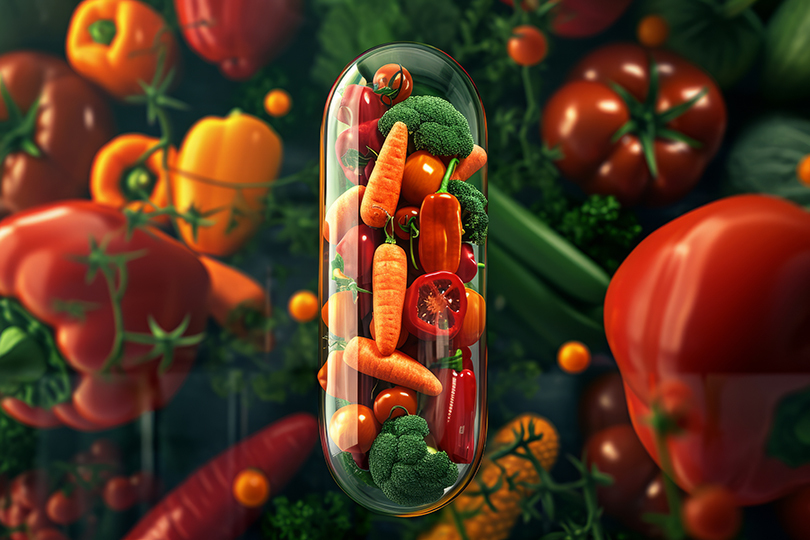Our body isn’t a machine but a living system that sends subtle signals when something is wrong. If you notice changes in your well-being in time, you can avoid serious consequences of nutrient deficiencies.
Below are seven key signs to watch out for if you want to maintain your health and energy.
1. Constant Fatigue and Weakness
When your body lacks iron, hemoglobin levels drop — this protein is responsible for carrying oxygen. As a result, your tissues receive less oxygen, and you may feel exhausted even after a short walk or a regular workday. If fatigue is accompanied by pale skin, dizziness, or shortness of breath during physical activity, it’s time to check your iron and vitamin B12 levels. B12 is essential for red blood cell formation and nervous system function. Its deficiency can lead to fatigue, tingling in the limbs, memory problems, and difficulty concentrating.
1. Constant Fatigue and Weakness
When your body lacks iron, hemoglobin levels drop — this protein is responsible for carrying oxygen. As a result, your tissues receive less oxygen, and you may feel exhausted even after a short walk or a regular workday. If fatigue is accompanied by pale skin, dizziness, or shortness of breath during physical activity, it’s time to check your iron and vitamin B12 levels. B12 is essential for red blood cell formation and nervous system function. Its deficiency can lead to fatigue, tingling in the limbs, memory problems, and difficulty concentrating.

2. Hair Loss and Brittle Nails
A sudden decline in hair and nail health can signal metabolic issues, often related to a lack of biotin (vitamin B7). Biotin supports the metabolism of fatty acids, promotes healthy skin and nails, and encourages hair growth. Deficiencies in iron, zinc, or protein can also contribute. Hair may become thinner, split easily, and fall out more than usual. Nails may break easily, develop vertical ridges, or show white spots.
3. Cracks at the Corners of the Mouth and Mouth Ulcers
Frequent cracks at the corners of your lips or painful ulcers inside the mouth may point to a deficiency in B vitamins, especially B2 (riboflavin) and B3 (niacin), as well as iron. These nutrients are involved in tissue repair and help maintain healthy skin and mucous membranes. A lack of them can make tissues more vulnerable, slower to heal, and more prone to irritation. Other symptoms may include dry lips, a burning tongue, and sensitivity to acidic foods.
A sudden decline in hair and nail health can signal metabolic issues, often related to a lack of biotin (vitamin B7). Biotin supports the metabolism of fatty acids, promotes healthy skin and nails, and encourages hair growth. Deficiencies in iron, zinc, or protein can also contribute. Hair may become thinner, split easily, and fall out more than usual. Nails may break easily, develop vertical ridges, or show white spots.
3. Cracks at the Corners of the Mouth and Mouth Ulcers
Frequent cracks at the corners of your lips or painful ulcers inside the mouth may point to a deficiency in B vitamins, especially B2 (riboflavin) and B3 (niacin), as well as iron. These nutrients are involved in tissue repair and help maintain healthy skin and mucous membranes. A lack of them can make tissues more vulnerable, slower to heal, and more prone to irritation. Other symptoms may include dry lips, a burning tongue, and sensitivity to acidic foods.

4. Bone Pain and Muscle Weakness
Vitamin D regulates the absorption of calcium and phosphorus, which are vital for bone health. A deficiency can make bones more fragile, increase the risk of fractures, and lead to osteoporosis. In adults, this may show up as dull pain in the lower back, knees, or pelvis, as well as general muscle weakness. People who get little sunlight or avoid dairy products are especially at risk. Low vitamin D levels can also lead to irritability and fatigue.
5. Poor Night Vision
Vitamin A is essential for the retina and plays a key role in low-light and night vision. A deficiency can cause night blindness — difficulty seeing in dim lighting. Additional signs may include dry eyes, burning, or a sensation of “sand” under the eyelids. Prolonged deficiency can damage the cornea, potentially leading to vision loss or even blindness. People with diets low in animal fats and colorful vegetables (like carrots, pumpkin, and spinach) are at greater risk.
Vitamin D regulates the absorption of calcium and phosphorus, which are vital for bone health. A deficiency can make bones more fragile, increase the risk of fractures, and lead to osteoporosis. In adults, this may show up as dull pain in the lower back, knees, or pelvis, as well as general muscle weakness. People who get little sunlight or avoid dairy products are especially at risk. Low vitamin D levels can also lead to irritability and fatigue.
5. Poor Night Vision
Vitamin A is essential for the retina and plays a key role in low-light and night vision. A deficiency can cause night blindness — difficulty seeing in dim lighting. Additional signs may include dry eyes, burning, or a sensation of “sand” under the eyelids. Prolonged deficiency can damage the cornea, potentially leading to vision loss or even blindness. People with diets low in animal fats and colorful vegetables (like carrots, pumpkin, and spinach) are at greater risk.

6. Muscle Cramps and Irregular Heartbeat
Nighttime cramps may indicate a deficiency in calcium, magnesium, or potassium — all crucial for nerve signaling and muscle contraction. When levels are low, muscles may contract suddenly and painfully. If cramps are accompanied by tingling in the fingers, numbness, tremors, or irregular heartbeats, it’s a strong sign you need a checkup. Calcium deficiency can also cause brittle nails, dry skin, and irritability.
7. Bleeding Gums and Slow Wound Healing
Vitamin C is necessary for collagen production — a protein that strengthens blood vessels, tissues, and skin. When levels are low, capillaries become fragile, and even simple activities like brushing your teeth can lead to bleeding gums. The body’s ability to heal wounds slows down, vulnerability to infections increases, and you may feel weak and irritable. Small skin hemorrhages called petechiae may also appear. Severe deficiency leads to scurvy.
Nighttime cramps may indicate a deficiency in calcium, magnesium, or potassium — all crucial for nerve signaling and muscle contraction. When levels are low, muscles may contract suddenly and painfully. If cramps are accompanied by tingling in the fingers, numbness, tremors, or irregular heartbeats, it’s a strong sign you need a checkup. Calcium deficiency can also cause brittle nails, dry skin, and irritability.
7. Bleeding Gums and Slow Wound Healing
Vitamin C is necessary for collagen production — a protein that strengthens blood vessels, tissues, and skin. When levels are low, capillaries become fragile, and even simple activities like brushing your teeth can lead to bleeding gums. The body’s ability to heal wounds slows down, vulnerability to infections increases, and you may feel weak and irritable. Small skin hemorrhages called petechiae may also appear. Severe deficiency leads to scurvy.

What Doctors in the U.S. Say
Dr. Patricia Graham from Rush Medical Center in Chicago believes the body always sends signals — we just have to learn to recognize them:
“There are many clear symptoms of vitamin and mineral deficiencies. The good news is that with proper dietary adjustments and supplements, they usually improve quite quickly,” says Graham.
Dr. Saurabh Sethi adds, “Brittle nails can point to a lack of protein and iron. Twitching eyelids may signal a magnesium deficiency. And joint cracking can indicate low levels of vitamin D3 or calcium”.
Dr. Patricia Graham from Rush Medical Center in Chicago believes the body always sends signals — we just have to learn to recognize them:
“There are many clear symptoms of vitamin and mineral deficiencies. The good news is that with proper dietary adjustments and supplements, they usually improve quite quickly,” says Graham.
Dr. Saurabh Sethi adds, “Brittle nails can point to a lack of protein and iron. Twitching eyelids may signal a magnesium deficiency. And joint cracking can indicate low levels of vitamin D3 or calcium”.

What to Do If You Notice Symptoms
First, avoid self-diagnosing. Even if you recognize a symptom from this list, it’s important to confirm it with lab tests. Consult your primary care physician or a nutritionist and get a general and biochemical blood test. Additional tests for vitamin and mineral levels may also be needed.
Prevention is always easier than treatment. Balanced nutrition is the best way to avoid deficiencies. Regularly include the following in your diet:
First, avoid self-diagnosing. Even if you recognize a symptom from this list, it’s important to confirm it with lab tests. Consult your primary care physician or a nutritionist and get a general and biochemical blood test. Additional tests for vitamin and mineral levels may also be needed.
Prevention is always easier than treatment. Balanced nutrition is the best way to avoid deficiencies. Regularly include the following in your diet:
- Fruits and vegetables (especially brightly colored ones — rich in antioxidants)
- Whole grains
- Protein sources (meat, fish, eggs, legumes)
- Nuts and seeds (rich in magnesium and zinc)
- Dairy or calcium-fortified plant-based alternatives
Listen to your body. Even small changes in appearance or well-being can be important signals. Responding in time can help you preserve your health and vitality for years to come.






